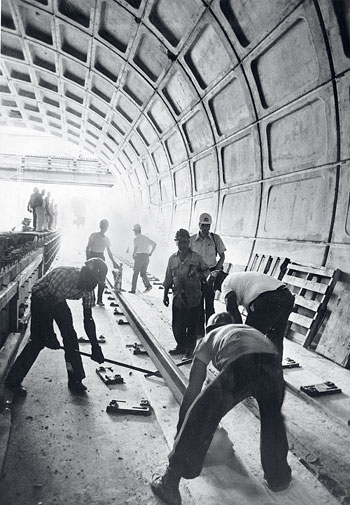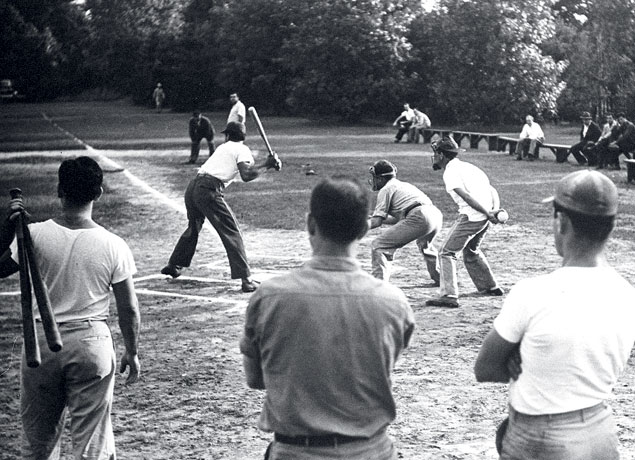We called ourselves the Dirt League, and dirtball was the game we played. We were the outlaw softball league of Washington, DC, the scourge of Potomac Park.
We were the men who built the Metro—carpenters, laborers, rod busters, tunnel rats, Teamsters. We worked all day in half-lit holes a hundred feet beneath the streets. It was hard and dangerous work. Six men were killed the year I was there. Dirtball was our escape from that dreary underworld. On game days, we were as jumpy as a congressman at a strip club. When the horn sounded at 5 o’clock, we’d clamber up out of our holes, pile into pickups, race to the park, and play softball until it was too dark to see.
It was the summer of 1974 and the fall of Richard Nixon. Watergate was in full swing, and Sam Ervin, the senior senator from my home state of North Carolina, was leading a homespun assault on all the President’s men. Fresh from flunking out of college and washing out of a career in small-town journalism, I’d come to Washington from Chapel Hill, part of a small army in blue blazers and starched khakis, each of us hoping to witness history from a front-row seat next to Senator Sam. A few of my friends made it on Capitol Hill, but I was forced underground. I signed on as an apprentice carpenter with Local 1051 of the United Brotherhood of Carpenters and Joiners and wound up playing shortstop on the strangest softball team ever assembled.
I wasn’t much of a carpenter, to tell the truth. I carried the obligatory red-handled, 22-ounce Plumb hammer like the other guys, but I could hardly drive a nail, and my left thumb was perpetually discolored. I think my foreman, a New Yorker named Jack Gohde, kept me around because I never complained when he sent me out every morning to buy coffee and Danish for the crew. A good thing, because without me, dirtball would never have been invented.
It happened this way: Gohde’s crew was the buzz of the underground that summer. In the hole that’s now the Foggy Bottom-GWU station, we were pouring concrete at a blistering pace. Every four or five days, the big ready-mix trucks would roll into Foggy Bottom and the green-brown mud would sluice down from the heavens. Nobody could come close to keeping up with us. Our nearest competitors were making a pour every seven days; the average around town was eight to ten.
To look at us, you wouldn’t have predicted that kind of productivity. Most of us were long-haired kids in our early twenties, the rest grizzled old boomers on their last big job. Gohde was the key. He was a subterranean Vince Lombardi, an organizational genius and master motivator who’d turned an unlikely contingent of misfits into a finely tuned, concrete-pouring machine.
We weren’t winning any popularity contests, however. Some of the crews resented the pace we were setting. They said we were making the rest of them look bad.
One night, a rival crew from the Dupont Circle station rolled into the Red Lion, our after-work hangout near George Washington University. After a few beers, a big Irish rod buster accused us of cheating. I retorted that if any of his crew had made it past third grade, they might be able to figure out how to keep up with us. He invited me outside for further discussion. Lucky for me, someone suggested we slug it out in another forum. Thus dirtball was born and the first game scheduled the following Wednesday after work at Potomac Park.

On game day, the hole moved at geologic speed. While the rest of us waited for the horn to blow, a few engineers and surveyors cut out early to stake a claim on the field and lay out the diamond. My job was to take a company pickup and bring back beer—no fewer than five cases, they said—and enough ice to cover them in the bed of the truck. The whole bill back then was less than $40.
By the time I got to the park, the game was in the third inning and we were down 9 to zip. It wasn’t hard to figure out why. Our best players were still on the sidelines. The office guys, the ones who worked above ground in air-conditioned trailers, had taken charge and put themselves in the starting lineup. We had a 62-year-old shortstop, a myopic centerfielder, and a morbidly obese first-baseman who shouldn’t have been allowed outside without a sports bra.
The rest of us got into the game in the fourth inning and staged just enough of a rally to make the final score respectable. Then we attacked the truckful of beer. The animus of the previous week was soon dissolved. We decided to reconvene at the Red Lion for additional lubrication.
Some hours later, one of the Dupont Circle guys said he had some friends on other crews around town, and he volunteered to try to get everyone together to discuss forming a league. We started play the next week with five teams and an eight-game schedule over the next six weeks. The two teams with the best records would meet in early August to decide the 1974 Dirt League Championship.
The next Monday, three new carpenters joined our crew. It was probably not a coincidence that all three could play ball.
One was Gohde’s son, a natural first-baseman who was about six-foot-five and had blond hair down to his belt. (His wife was a dead ringer for Cher, and between them they probably had a good five feet of hair.) He was joined by his cousin, a wiry second-baseman who spent lunch reading the Bhagavad-Gita and eating raw vegetables. The third was our catcher, a burly ex-cop named Bill Flynn who six years before had stood on the Pentagon steps in front of about a half million raging antiwar protesters. After he’d been with us awhile, I asked him what he would have done if they’d mounted a charge. “Busted some heads,” he said. How about if I’d been one of them? “Busted your head like a melon.” He laughed, but I’m pretty sure he wasn’t kidding.
With the addition of our new players and the withdrawal of the office boys from the field, we became a fairly good ball club. We wound up in second place, a game back of our old nemeses at Dupont Circle. We’d managed to hand them their only loss and thus set up the rubber match with everything on the line. To make it more interesting, we bet that the losers had to buy all the alcohol until the last man stopped standing.
The championship game was tied in the bottom of the seventh with Dupont Circle at bat. They quickly put runners on second and third before the next batter popped weakly to third. Their best hitter came to the plate, a lefty with home-run power who’d never made an out against us. We pulled the old Ted Williams shift on him, and I moved into short right field. On the first pitch, he lined one over the second-baseman’s head that handcuffed me for a second, but I sprinted to my left and made a lucky catch. I saw the runner on third tag up and head home with the winning run. I planted my left foot and heaved the ball with all my strength. At first I thought I’d thrown it in the Potomac, but in mid-flight it miraculously corrected course and began curving like a parenthesis right toward Flynn’s waiting glove.
The runner and the ball arrived simultaneously, but Flynn had blocked the plate with his left foot like a trained major-leaguer. I saw the ball hit glove dead center and dead level with the sliding runner. Out. No doubt. Double play. Extra innings. When I looked again, the ball was bouncing away and the Dupont Circle team was celebrating.
We slumped off the field. Flynn stood there dejected, staring down at his glove in disbelief like Jon Voight in Midnight Cowboy. My last dirtball memory was of Flynn walking deliberately to his truck, pulling out his Plumb hammer and a 16-penny double-headed nail, and with one angry blow nailing his glove to the nearest tree.
Jim Hughes (jimhughespr@gmail.com) left “the hole” in 1975, and some say he hasn’t done an honest day’s work since. He was press secretary for North Carolina congressman Ike Andrews in the Reagan years before returning to Raleigh to found a PR/marketing firm.
This article appears in the July 2012 issue of The Washingtonian.

















